Questiony dog is scared of evrything. I got her from a germen sheperd breeder, the place was very clean and the breeder seemed very nice, he loved his animals so i dont think there was any abuse. However my dog doesnt bark when someone is at my door - and she literally crawl on me. yes this big 70 lb dog crawl up on me and hides her face with the slightest noise. is there anything i can do to help her.
AnswerHow old was the puppy when you got it? Many breeders that should know better fail to see to it that the puppies get exposed to things between 6 and 12 weeks. That is a very dangerous period when taking puppies out can mean picking up a life threatening disease, and not doing so causes the very problem you have. Puppies that are kept in the kennel too long may only be fit to live in a kennel. Make sure the breeder knows you are having problems. Ask how much socilization the puppy has had.
You can try some confidence building and bonding training. Don't push the puppy too much. Start with obedience training. The key to most behavior problems is approaching things using the dog's natural instincts. Dogs see all the people and dogs in the household as a pack with each having their own rank in the pack and a top dog. Life is much easier if the 2 legged pack members outrank the 4 legged ones. You can learn to play the role of top dog by reading some books or going to a good obedience class. A good obedience class or book is about you being top dog, not about rewarding standard commands with a treat. Start at http://www.dogsbestfriend.com/ As you praise the dog for following your commands, it will build its confidence.
Play tug of war with the dog and lose. However at the end of the game, take the rope or toy and put it up, less the dog becomes confused about who is top dog. Ropes from the pets' store quickly turn to hazardous shreds. Ones I made lasted much better. Go to a hardware or home center that sells rope by the foot. Buy 2' of 3/4" poly rope. Melt the ends, and tie knots in it. Get them as tight as possible, put it in a vise and pound it with a hammer. Watch carefully, and be ready to discard when it comes apart.
Finally, make sure it has a den to live in. If you are not using a crate, buy one. The dog may be happier in its den than loose in the house. It relaxes, it feels safe in its den. It rests, the body slows down reducing the need for water and relieving its self. Dogs that have been crated all along do very well. Many of them will rest in their crates even when the door is open. I think the plastic ones give the dog more of a safe, enclosed den feeling. Metal ones can be put in a corner or covered with something the dog can't pull in and chew. Select a crate just big enough for the full grown dog to stretch out in.
A dog that has not been crated since it was little, may take some work. Start out just putting its toys and treats in the crate. Praise it for going in. Feed it in the crate. This is also an easy way to maintain order at feeding time for more than one dog.
''Elevation for small puppies: Sit on the floor and gently put your hands around your pup's middle, below his front legs, and lift him up. He is facing you. Hold him for 15 seconds. Repeat until he no longer struggles. If he is past 10-12 weeks, lift his front feet off the ground, but don't pick him up.
Cradling for small puppies: Hold your puppy gently on his back, as you would cradle a small baby. If he struggles, hold him firmly until he quiets for 10-15 seconds. With larger pups, you can do this as your sit on the floor, with your pup between your legs.
Quiet lying down: Place your pup on the floor on his side, with all 4 legs pointing away from you. Use your hands on his neck/shoulder area and middle, to hold him in this position. When he is quiet, praise him. Lengthen the time that you keep him quietly in this position. When he accepts this position well, handle his paws and muzzle, while keeping him quiet.''
The quotes mean this isn't my original work. It is copied from my Puppy Raising Manual. I have long used these or minor variations of them, and they are very effective. You may want to give him a belly rub while he is on his back too. Helps bonding. There is a big difference between him rolling over and demanding a belly rub, and you choosing a time to roll him over and rub his belly. The latter cements your place as pack leader.
Such a severe problem may take a private trainer or behaviorist to work it out.

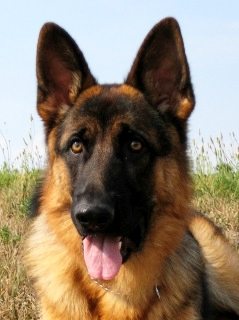 2yo German Shepherd Male
Question
My Boy...
Hi there....I have a 2 year old, pur
2yo German Shepherd Male
Question
My Boy...
Hi there....I have a 2 year old, pur
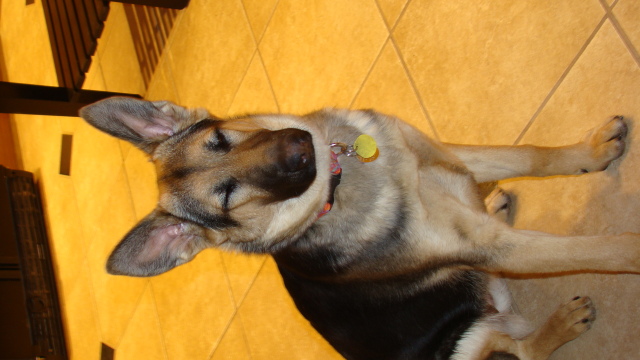 tymber
Question
tymber
ok my gsd is now 7 months old and i hav
tymber
Question
tymber
ok my gsd is now 7 months old and i hav
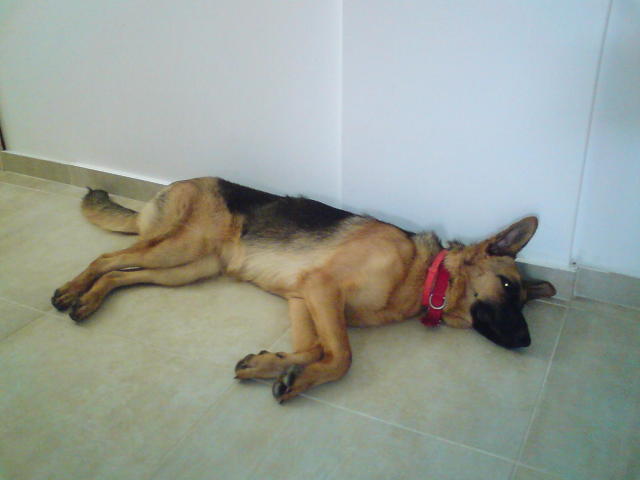 puppy growing thin and tall
Question
Lying down
Hi, I have a 9 month old German She
puppy growing thin and tall
Question
Lying down
Hi, I have a 9 month old German She
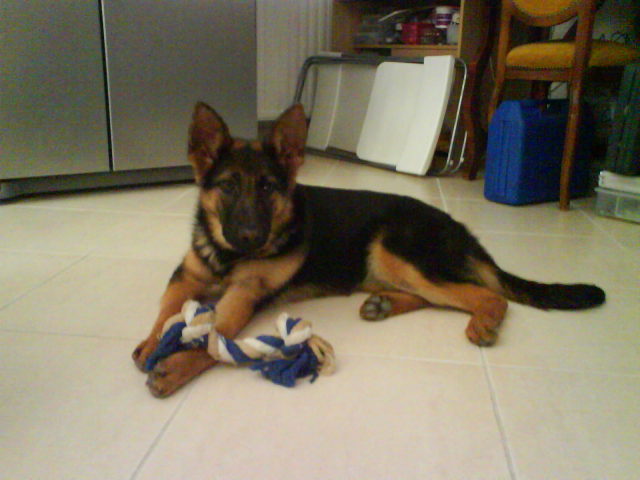 poor growth because bad nutrition
Question
7 month
I bought a female gsd when she was 7 m
poor growth because bad nutrition
Question
7 month
I bought a female gsd when she was 7 m
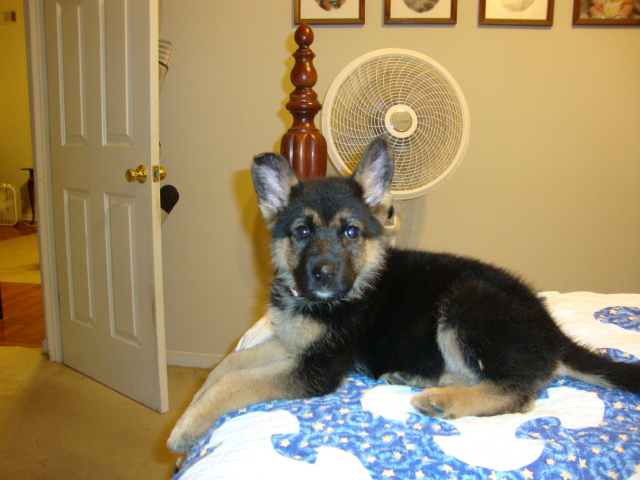 puppy wont eat
Question
ava 8weeksweeks
i have a purebred german sheph
puppy wont eat
Question
ava 8weeksweeks
i have a purebred german sheph